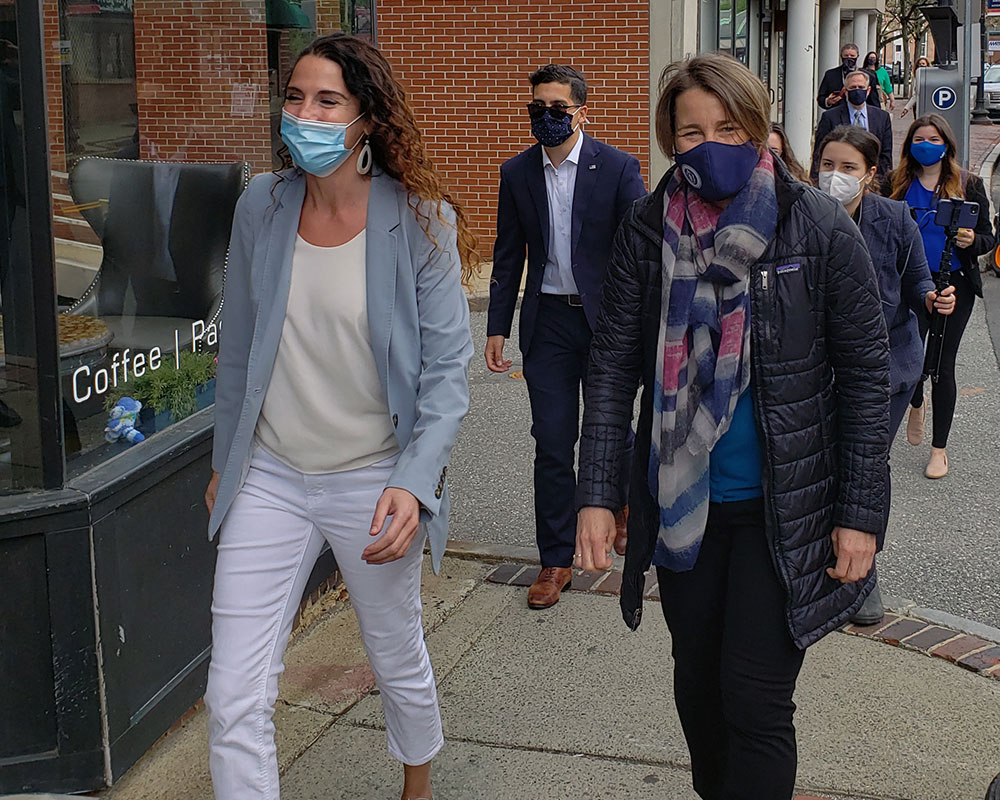Haverhill businesses that survived the pandemic say they’re not sure they’ll survive the recovery unless government changes its approach.
Business owners told state Attorney General Maura Healey and Sen Diana DiZoglio Monday the biggest problems they face are a shortage of employees, interruptions in receiving goods and rules that keep them from getting government relief. Krueger Flatbreads owner Jason Petrou said workers are staying home.
“It’s not so much getting customers in at this point in time. It’s staffing. That’s the hardest part from us and what we’re hearing is a lot of that has to do with the unemployment benefits being so great at this point in time,” he said during a business roundtable at his restaurant.
Mags Conneely of Peddler’s Daughter, Mohamed Machkour, owner of Wicked Big Café, and Angelo Asprogiannis, owner of La Pizza di Forno, all added their businesses have stayed open thanks to existing staff working overtime. Asprogiannis noted that can’t last.
“We’re working 60-, 65-hours-per-week. It’s not the payment of overtime. We’re glad to pay the difference, but we’re burning them out,” he said.
Paul Tomacchio of Stuft, who will soon open Stackd with his brother Anthony at the former Lasting Room, centered on supply chain issues that cause costs to double and triple for meat on top of overtime costs.
“We’re in the middle of the great poultry crisis. Right now, without their being enough help in poultry, where their dealing with the chickens and what not, so there’s the chickens there, but we can’t get them because there’s not enough people deboning them. There’s not enough people prepping them,” he explained.
Many said they will have to reduce hours or days of operation if staffing remains a problem.
Kathy Rurak, associated with Haverhill’s Latino Coalition, suggested reshaping programs that give people an incentive to go back to work. Healey said, while she doesn’t work in federal government, she does confer with attorneys general in other states and can push for needed adjustments.
“It really kills me today to hear you’re ready to serve food, you’re ready to do stuff and you don’t have the bodies to actually do what you need to do,” she said.
Edward Chernesky, the 80-year-old owner of Shoe City Hardware, said the problem isn’t contained to food service.
“We were running into problems. Can’t find chlorine. Can’t find propane. Along the lines and the sentiment of everybody else in this room—help. I’ve been in business for 45 years. I’ve never seen anything like this. This is truly a pandemic of another sort,” he said.
Northern Essex Community College President Lane A. Glenn said the school’s new culinary arts center downtown can help turn out food service workers, but students need help paying tuition. He said he is “skeptical” of some of the free college proposals because they won’t last over time and don’t attract students who “have some skin in the game.”
HamdAllah Olona of GoodieKrunch and Kristen Carbone of Carbone’s Kitchen both noted federal benefits don’t extend to them for a variety of reasons. DiZoglio said there is state legislation pending that could help.
“Many like Kristen have invested their life savings into these new businesses. Through no fault of their own, with the pandemic happening, are about to lose everything they already haven’t and we still, in state government, need to get some of this grant programs across the finish line,” she said.
Healey and DiZoglio also toured Wicked Big Café and Salon Mii No.2, owned by Marysol Cueto. They were joined during the listening tour by Mayor James J. Fiorentini, City Councilor Joseph J. Bevilacqua, state Rep. Andy X. Vargas, Greater Haverhill Chamber of Commerce President Irene Haley and others.
